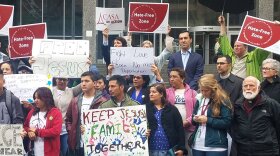Iris is a single mom who worked in a factory in Honduras. She tried twice to get to the United States. She and her son, Edmondson, made it on June 14th, crossing the border at El Paso, Texas.
But the next day, Edmondson’s sixth birthday, they were separated. Immigration officials put Iris in a Texas jail and her son in a facility in Arizona.
She says she wasn’t able to communicate with him from jail. Even worse, she didn’t know where he was.
Through an interpreter, she says it left her, "with a panic and a terror – not knowing where they’d taken him." And she lived like that for six days. She describes it as living in a "shadow of uncertainty."
On the seventh day she was moved to a transition house and allowed to talk to her son on the phone several times a week. Edmondson would tell her, "Mommy, I just want to be with you."
Edmondson was among some 3,000 children separated from their parents at the southern US border under the Trump administration’s "zero tolerance" policy and held in facilities scattered throughout the US. A federal judge gave the administration until Thursday, July 26, to reunite those families. Meanwhile, the administration has deported 400 parents without their children.
Iris, however, was one of the lucky ones. She came with papers that showed she had a sponsor in Maryland—the wife of a friend from Honduras—she could live with and who would support her. And she made sure Edmondson had copies of those documents with him.
Iris arrived in Baltimore by bus a few weeks ago wearing an Immigrations and Customs Enforcement ankle monitor. Edmondson arrived a few days later. A month after they were separated, they were together again.
We met in a coffee shop downtown, just a few days after their reunion. They were on their way to the National Aquarium to celebrate Edmondson’s birthday—the one they missed back in June.
Edmondson sat next to his mom, holding a Lightning McQueen cup and wearing paw patrol sneakers that light up. He remembered his time in Arizona, playing soccer and taking English lessons. He said there were children who were always fighting with one of his roommates, seven year old Daniel.
"Daniel cried for his momma," Edmondson remembered.
Honduras and The Northern Triangle
Iris says she loves her country, but the situation there is very difficult.
It’s one of three, along with Guatemala and El Salvador, known as the Northern Triangle of Central America.
Sarah Bermeo, an associate professor of public policy at Duke University, says “90% of the cocaine that comes into the U.S. comes from these countries.”
Bermeo, who also writes for “Future Development,” a blog published by Duke, the World Bank Organization, and the Brookings Institution, says all that cocaine is being trafficked by gangs for international networks. And it’s turned the Northern Triangle countries into the most violent on earth.
She points to a report from Doctors without Borders that analyzes data from those countries and finds “unprecedented levels of violence outside a war zone”.
Kidnapping is common. Drug gangs often go into the schools to recruit.
Gangs and drug cartels "are threatening to kill a family member if their son doesn’t join a gang or if their daughter isn’t allowed to marry into the gang," Bermeo says.
Bermeo says people who leave Northern Triangle countries aren’t just "looking for a better life" in the United States; they’re fleeing for their lives.
These are people looking for asylum, Bermeo says, and they will try to get it at any cost, even if it means entering the US illegally.
"If we push them to the shadows they’re going to use traffickers," she says. "And that’s going to enhance the ability of these criminal organizations to charge more and carry out more criminal activity."
Iris won’t talk about how she got to the border. It’s the first thing she tells me when we meet.
And she won’t say much about her family – except that she has a nineteen year old daughter who’s still in Honduras and didn’t try to cross with her this time.






